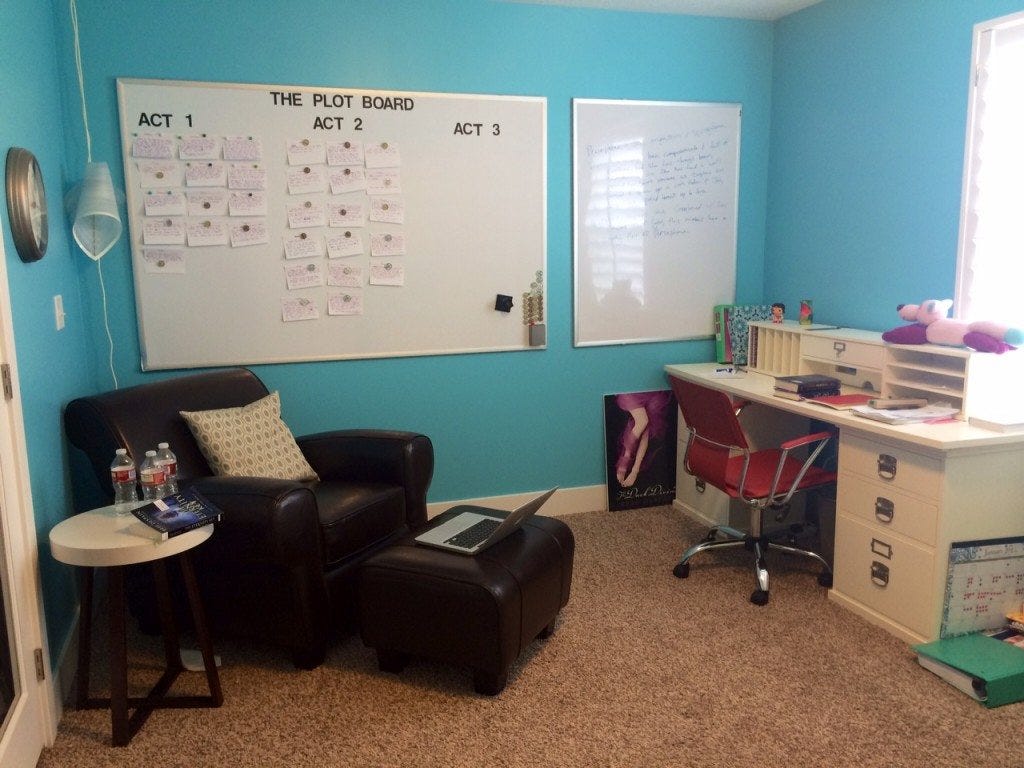Guest Post: Beating Deadlines with Healthy Writing Habits
[box type="note"]We're continuing the highlight of Egmont books and writers here at PubCrawl with Bree Despain and The Eternity Key![/box]
I once saw a fellow YA author tweet something to the effect of: “Books are made out of caffeine, sugar, and tears.” This sentiment stuck with me (though not the author’s name, unfortunately) because it was not only simultaneously hilarious and sad—but also because it was very true to what my own writing process used to look like only a year ago.
About this time last year, I found myself in my doctor’s office because my health was total crap. I wasn’t sleeping, I had no energy, my anxiety was through the roof, I was testing as pre-diabetic, my hormones and thyroid were out of whack, my adrenals were burned out, and my BMI was far too high for both my and my doctor’s liking. I told my doctor that I was confused by my extremely unhealthy state because whenever I am “not on deadline” I try to eat as healthy as possible and be physically active. My doctor then asked me to describe what I’m like when I am on deadline.
My deadlines have always been tight (about 2 to 3 months to produce a first draft, and about 3 weeks or less per revision) and I found myself describing long days (sometimes 12 to 16+ hours) in front of a laptop, eating chocolate covered cinnamon bears, Swedish Fish, gluten free cookies, whatever take-out my husband brought home, and guzzling Coke Zero, to keep myself half-crazed and barreling toward that ever impending deadline. To this my doctor responded, “So basically you use sugar and caffeine to whip yourself into a manic frenzy in order to write a book?” After I nodded grimly at her assessment, she went on, “Well, we either need to figure out how to completely overhaul your writing process or you need to find a new career, because being an author is literally killing you.”
My doctor’s pronouncement was both devastating and a big “duh” moment for me. Rather than give up the career I love, I decided to dedicate myself to creating healthier (and happier) writing habits. I’ve spent the last year researching, consulting other professionals, and trying out new tricks and habits. During that same time, I thoroughly revised one book (The Eternity Key, which will be published on April 28th!) outlined two more books, and crushed a deadline for a first draft on another book—all while increasing my daily output by shortening my writing days, improved my emotional and physical wellbeing, and losing 40 pounds (instead of packing on my usual 15 pounds of “book baby weight” per deadline).
My new writing process is kind of involved (I could probably write a whole book on it) but I thought I would share a few of the highlights with you in case you’re inclined to make a few changes to your own process:

1. Take on a book (or any large task) in bite-sized pieces.
To me, the act of writing an entire book is daunting, and thinking about it as a whole is an immediate trigger for writer’s block. I’ve learned through trial and error over the course of seven books that I do best if I look at a book in bite-sized pieces—or scene by scene. I am both a very visual and a hands-on person, so when I plot a book, I do it by hand. I start by covering my walls with giant Post-it notes and list out ideas and questions. Once my ideas start to gel, I pull out a set of blank notecards. I ask myself, “what are the ten most important things I want to have happen in this book?” Or “What are the ten most important scenes?” I write out a card for each of those scenes (with about a two sentence description) and then start thinking of all the scenes I need to connect those ten scenes together. I keep making cards until I have a big stack, and then I use a magnet board to arrange them in a three-act structure—filling in or making changes as I go—and pretty soon, I have an entire book outlined scene by scene. When I sit down to write for the day, I will take two or three scene cards down from the board and those are the scenes (or bites) I will work on for the day.
2. Clear your mind before starting your work.
Many people have recommended meditation to me over the years, but I used to write it off as new-agey mumbo jumbo. However, after listening to several Ted Talks that recommended daily meditation, I decided to give it a try—and holy crap, it actually works! I’ve had many a meditation session end with an answer to a plot quandary or character issue popping into my head. I now start my writing day with a ten to fifteen minute meditation session. I use an app called Simply Being to guide me through each session.
3. Try to compartmentalize your writing time.
I used to spend long hours, day and night, chained to my computer during deadlines—much to my family’s detriment and displeasure. Now, I try my best to keep my “author hours” compartmentalized between the hours of 9 a.m. and 3 p.m. while my kids are in school. This is my time for writing, taking care of author business, marketing, blogging, etc., so that when my kids get home, I can remove my author hat and put on mommy one. (Though once homework is done and the kids go off to play, I may sneak in a writing sprint later in the day if I find myself alone in the house.) Both my family and I are so much happier when I’m not trying to multi-task writing and mommy-ing at the same time. (And did you know that multi-tasking lowers your IQ more than if you were stoned?)
4. Compartmentalize your writing time even more with “productivity sprints.”
There are so many important non-writing tasks that go along with being author (and non-important ones like Twitter) than can end up filling all my time if I am not careful. I am also naturally a very slow writer—I used to average anywhere from 250 to 700 words a day after many agonizing hours. To combat these problems during deadlines, I’ve become a big fan of writing sprints. After my morning pre-writing routine (which would take another blog post to describe) and my meditation, I take a scene card, sit down at my laptop, and set a timer for an hour. I then challenge myself to write at least a thousand words during that hour. I’ve found that speedwriting helps me turn off my inner critic and get the words on the page. I tell myself that it is okay to write crap during these sprints because I can always revise them later, but I’ve actually found that most of my best writing happens while I’m in speed mode. It’s like I’m tapping into my subconscious brain, and scenes I’ve been dreading writing almost seem to magically work themselves out as I go with very little conscious thought on my part. I try to do 2 to 3 writing sprints during my “author hours” and often find my daily word count to be between 2000 to 5000 words. That sure beats agonizing for hours over 500 words!
I will also set a timer and do productivity sprints for other non-writing author tasks—like responding to emails or writing this blog post.
5. Take breaks!
Between my writing sprints, I give myself permission to take breaks. I get up and go for a short walk (or even just walk up and down my stairs a few times to get my blood flowing), check Twitter (though I really have to be careful with this), text with friends, read, or watch a show while I eat lunch. (Chopped and Project Runway are my favorite lunch break shows—I find it very motivational to watch other people be creative.)

6. Trade out the sugar and caffeine for healthy snacks and water
This was the hardest (and best) change to my writing process. Because of my hormone and blood sugar issues, my doctor put me on a very specialized diet (think stricter than Paleo). I cried when she handed me my new “lifestyle” guidelines and thought, “How can I ever write without sugar and caffeine?” But on my doctor’s orders, I traded in my cinnamon bears and other goodies for nuts, berries, avocados, olives, veggies, and raw food protein bars. Instead of Coke, I guzzle bottles of water. At first, I thought this change was going to kill my writing, but now I find that I leave my writing sessions feeling healthy instead of gross and bloated. I feel even-keeled instead of hopped up and cranky. And because I’m not staying up late to write anymore and my stress levels are lower, I find I don’t need caffeine at all to get through the day. (My doctor does allow me a few pieces of 75% dark chocolate a day, and you better believe I savor the heck out of those!)
7. Reward yourself!
I once read in an interview that Joss Whedon calls part of his writing process “feeding the monkey” because he has to reward himself with treats for getting his work done. I adopted this practice, but instead of using edible treats, I found other ways to reward myself. Every time I add 7,000 new words to a story, I give myself a prize. Maybe it’s a new pair of fuzzy socks to wear while I’m writing, a new book, or a date-night out with my husband. I sometimes even get my husband to buy me little inexpensive presents and wrap them up so I don’t know what they are. The anticipation is often motivating enough to get me to squeeze in one more writing sprint before my “author hours” end.
Okay, I could go on and on (like I said, I could probably write a book on this topic) but I should probably let the Pub Crawl gang have their blog back! You may not be in need of a complete writing process overhaul like I was, but I hope you found at least a couple of helpful tips to try out. Let me know what you think, or share your ideas for creating a healthier writing process.
[hr]
BREE DESPAIN is the author of the Dark Divine trilogy and the Into The Dark trilogy. Bree rediscovered her childhood love for creating stories when she took a semester off college to write and direct plays for at-risk, inner-city teens from Philadelphia and New York. She currently lives in Salt Lake City, Utah with her husband, two young sons, and her beloved TiVo.
